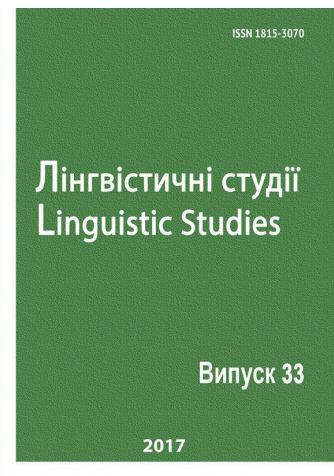Towards an Integrative Approach to Identity Construction in Academic Discourse.
Keywords:
identity, self-representation, stance, voice, positioningAbstract
Stance and voice are two different, though complementary, approaches to identity construction in academic discourse. Stance is mostly restricted to positionality, while the construct of voice also sheds light on various personal traits of the writer. While the “stance and engagement” model of K. Hyland has been predominant in researching authorial identity in academic writing so far, it has a number of deficiencies, primarily lack of attention to different functions of first-person pronouns and reader pronouns, as well as failure to account for non-discursive textual features and other identity manifestations beyond positionality. Even though it has gained significantly less popularity in empirical research, Ivanič’s and Camps’ tripartite model of voice as positioning is a more comprehensive approach to identity in academic discourse. We put forward a theoretical framework that is essentially based on Ivanič’s and Camps’ categories of ideational, interpersonal and textual positioning, while also incorporating Hyland’s concepts of hedging and boosting to enable more efficient and structured analysis.References
Biber, Douglas, and Edward Finegan. "Styles of stance in English: Lexical and grammatical marking of evidentiality and affect." Text - Interdisciplinary Journal for the Study of Discourse 9.1 (1989): 93-124. Web.
Bucholtz, Mary, and Kira Hall. "Identity and interaction: a sociocultural linguistic approach." Discourse Studies 7.4-5 (2005): 585-614. Web.
Burgess, Amy, and Roz Ivanič. "Writing and Being Written: Issues of Identity Across Timescales." Written Communication 27.2 (2010): 228-55. Web.
Fløttum, Kjersti (2012). “Variation of stance and voice across cultures”. Stance and voice in academic writing. Ed. by Ken Hyland and Carmen Sancho Guinda. London: Palgrave-MacMillan, 2012. 218-231. Print.
Gray, Bethany, and Douglas Biber. “Current Conceptions of Stance”. Stance and voice in academic writing. Ed. by Ken Hyland and Carmen Sancho Guinda. London: Palgrave-MacMillan, 2012. 15-33. Print.
Hyland, Ken, and Feng (Kevin) Jiang. "Change of Attitude? A Diachronic Study of Stance." Written Communication 33.3 (2016): 251-74. Web.
Hyland, Ken. "Boosting, hedging and the negotiation of academic knowledge." Text - Interdisciplinary Journal for the Study of Discourse 18.3 (1998): 349-382. Web.
Hyland, Ken. "Disciplinary voices: Interactions in research writing." English Text Construction 1.1 (2008): 5-22. Web.
Hyland, Ken. "Stance and engagement: a model of interaction in academic discourse." Discourse Studies 7.2 (2005): 173-92. Web.
Ivanič, Roz, and David Camps. "I am how I sound: Voice as self-representation in L2 writing." Journal of Second Language Writing 10.1-2 (2001): 3-33. Web.
Ivanič, Roz. Writing and Identity: The Discoursal Construction of Identity in Academic Writing. Amsterdam: Benjamins, 1998.Print.
Jaffe, Alexandra. “Introduction: The sociolinguistics of stance”. Stance: Sociolinguistic Perspectives. Ed. by Alexandra Jaffe. Oxford: Oxford University Press, 2009. 3-28. Print.
Keisanen, Tiina. “Stancetaking as an interactional activity: Challenging the prior speaker”. Stancetaking in discourse: Subjectivity, evaluation, interaction. Ed. by Robert Englebretson. Amsterdam: Philadelphia, 2007. 253–281. Print.
Kiesling, Scott. “Style as stance: Can stance be the primary explanation for patterns of sociolinguistic variation?”. Stance: Sociolinguistic Perspectives. Ed. by Alexandra Jaffe. Oxford: Oxford University Press, 2009. 171- 194. Print.
Matsuda, Paul Kei. "Identity in Written Discourse." Annual Review of Applied Linguistics 35 (2015): 140-59. Web.
Scherer, Klaus R. "What are emotions? And how can they be measured?" Social Science Information 44.4 (2005): 695-729. Web.
Sheldon, Elena. "From one I to another: Discursive construction of self-representation in English and Castilian Spanish research articles." English for Specific Purposes 28.4 (2009): 251-65. Web.
Sperling, Melanie, and Deborah Appleman. "Voice in the Context of Literacy Studies." Reading Research Quarterly 46.1 (2011): 70-84. Web.
Starfield, Sue, and Louise J. Ravelli. "“The writing of this thesis was a process that I could not explore with the positivistic detachment of the classical sociologist”: Self and structure in New Humanities research theses." Journal of English for Academic Purposes 5.3 (2006): 222-43. Web.
Tang, Ramona, and Suganthi John. "The ‘I’ in identity: Exploring writer identity in student academic writing through the first person pronoun." English for Specific Purposes 18 (1999): 23-39. Web.
Tardy, Christine. “Current Conceptions of Voice”. Stance and voice in academic writing. Ed. by Ken Hyland and Carmen Sancho Guinda. London: Palgrave-MacMillan, 2012. 34-50. Print.
Vassileva, Irena. Who is the author?: A contrastive analysis of authorial presence in English, German, French, Russian and Bulgarian academic discourse. Sankt Augustin: Asgard-Verl., 2000. Print.
Yakhontova, Tatyana. "Cultural and disciplinary variation in academic discourse: The issue of influencing factors." Journal of English for Academic Purposes 5.2 (2006): 153-67. Web.
Yang, Yingli. "Exploring linguistic and cultural variations in the use of hedges in English and Chinese scientific discourse." Journal of Pragmatics 50.1 (2013): 23-36. Web.


